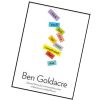7 Open Source Books That Separate Experts from Amateurs
Recommended by Ben Goldacre, Scott Hanselman, and Linus Torvalds for mastering Open Source Books






What if the keys to thriving in the open source world were hidden in seven books? Open source software isn't just code—it's a vibrant, living ecosystem shaped by collaboration, innovation, and dedication. Today, open source impacts everything from the apps on your phone to the infrastructure running global enterprises. Understanding its culture and tools can transform how you contribute and grow.
Ben Goldacre, a physician and researcher at Oxford, praises Working in Public for its insightful look into the social dynamics behind open source projects, highlighting how these lessons extend beyond software. Meanwhile, Scott Hanselman, a Microsoft engineer deeply embedded in open source communities, credits Forge Your Future with Open Source with providing clear strategies to build skills and networks essential for success. And who better to guide us through open source’s origins than Linus Torvalds, creator of Linux, whose memoir Just for Fun reveals the human story behind a revolution.
While these expert-curated books provide proven frameworks, readers seeking content tailored to their specific background, skill level, or goals might consider creating a personalized Open Source book that builds on these insights, offering a unique path through the open source landscape.
Recommended by Ben Goldacre
Doctor, academic at Oxford CEBM
“I've read the first half, this book is an excellent thoughtful description of the culture / practice of open source software projects, interesting to me as relevant to other forms of mass technical collaboration (like health data science where *not* sharing code is somehow ok!)” (from X)
After analyzing hundreds of developer interviews and open source projects, Nadia Eghbal developed a nuanced view of how modern open source software functions not just as code but as a social ecosystem. You learn about the lifecycle of open source projects, the often invisible maintenance work that sustains them, and how platforms like GitHub shape collaboration and incentives. The book also draws parallels between open source creators and broader online creators, offering insights into how individual contributors navigate public work and community dynamics. If you're interested in the intersection of software development, social collaboration, and digital infrastructure, this book offers a clear-eyed exploration of what it means to work in public today.
Recommended by Scott Hanselman
Microsoft engineer and open source advocate
“I've been working in open source for almost two decades. I went to Microsoft a decade ago to open-source .NET and C#. I wish I'd had a copy of VM's book. This book offers valuable historical context and practical guidelines on how and when to work on an Open Source project. Forge Your Future with Open Source will no doubt empower the next generation of contributors and I'm envious of their bright futures!” (from Amazon)
by VM (Vicky) Brasseur··You?
The methods VM (Vicky) Brasseur developed while leading software teams and shaping open source business strategies form the backbone of this guide. You learn how to navigate the open source landscape from understanding its history and ethos to selecting projects that align with your personal and professional goals. The book breaks down technical and community aspects, showing you not just how to contribute code but also documentation, design, or community organizing. Whether you’re a programmer, writer, or designer new to open source, this book equips you with the skills to make meaningful contributions and build your network effectively.
This personalized book explores open source principles and collaboration through a lens tailored to your background and goals. It covers key concepts such as community dynamics, licensing, and toolsets, weaving them together to match your interests and experience level. By focusing on what matters most to you, the book reveals how open source ecosystems function and how you can effectively participate and contribute. With a tailored synthesis of collective knowledge, it examines communication practices, project workflows, and technical tools that empower contributors. This approach ensures you engage deeply with open source culture and skills that align precisely with your aspirations, providing a unique and focused learning journey.
Recommended by Joel Spolsky
Co-Founder of Fog Creek and Stack Overflow
by Linus Torvalds, David Diamond··You?
by Linus Torvalds, David Diamond··You?
Linus Torvalds' decades of experience as the creator of Linux and a pivotal figure in software development led to this revealing memoir. The book unfolds how an unintended journey sparked the open source revolution, offering insights into collaborative software development and innovation culture. You’ll find chapters explaining the Linux kernel’s evolution and the principles of open source that challenge traditional proprietary models. This narrative suits programmers, tech enthusiasts, and anyone curious about how grassroots movements can reshape entire industries. It doesn’t promise a technical manual but invites you to understand the philosophy and human story behind one of software’s most influential phenomena.
When Scott Chacon, CIO and co-founder of GitHub, co-wrote this guide, he drew from decades of deep involvement with Git and open source communities. You'll learn how to navigate Git's distributed version control system, mastering workflows, branching, merging, and even extending Git's capabilities to suit complex projects. The book breaks down topics like GitHub integration and version control essentials with clarity, making it ideal if you want to improve collaboration on software projects or contribute to open source. Whether you're a developer seeking advanced Git techniques or someone wanting to understand version control fundamentals, this book offers practical insights without fluff.
Recommended by Phil Shapiro
Edtech blogger and open source advocate
“@ANGELARUFINO1 thx for the follow, Angela. I'm an open source enthusiast at a Linux-centric public library in the DC-area. I'm a big fan of @charlie3's work in the Penn Manor School District -- His book is amazing.” (from X)
by Charlie Reisinger··You?
Unlike most open source books that focus narrowly on software development, Charlie Reisinger draws on his experience as Technology Director at Penn Manor School District to show how open source principles can reshape education technology programs. You learn how open source tools like Linux, LibreOffice, and Moodle can drastically cut costs while encouraging student-led innovation, such as the creation of a student help desk and custom software solutions. The book offers a detailed case study of launching a one-to-one laptop program grounded in collaborative, open source culture, making it a valuable guide for educators and administrators looking to transform their schools' technology landscape.
by TailoredRead AI·
This tailored book explores the essential steps to quickly integrate and contribute effectively within open source communities. It covers how to identify suitable projects, navigate community dynamics, and build your presence through targeted contributions. The personalized content focuses on your unique background and goals, ensuring you engage with the open source world in a way that matches your skills and interests. It reveals practical sequences for rapid involvement and impact, emphasizing collaboration, communication, and technical proficiency. By focusing on your specific aims, this book provides a clear, enjoyable learning experience that bridges expert knowledge with your personal journey in open source development.
by Massimo Banzi, Michael Shiloh··You?
by Massimo Banzi, Michael Shiloh··You?
Massimo Banzi, co-founder of Arduino, brings decades of experience in software architecture and design education to this approachable guide on the Arduino platform. You’ll learn to navigate the Arduino IDE, understand the basics of electronics, and build projects from simple LED circuits to WiFi-enabled devices, with practical examples like a custom plant-watering system and internet fistbump. The book demystifies prototyping using solderless breadboards and schematic diagrams, making it accessible whether you're a hobbyist or educator. If you're eager to dive into open source electronics and physical computing, this book equips you with the foundational skills to start creating confidently.
Recommended by Joel Spolsky
Co-founder of Stack Overflow and Trello
by C. Pilato, Ben Collins-Sussman, Brian Fitzpatrick··You?
by C. Pilato, Ben Collins-Sussman, Brian Fitzpatrick··You?
While working as core developers of Subversion, C. Pilato, Ben Collins-Sussman, and Brian Fitzpatrick created this guide to address the complexities developers face with version control. You learn how to use Subversion 1.5 effectively, from basic concepts to advanced repository administration, including branching, merging, and access control. The book offers practical insights on configuring Subversion for various projects, making it useful whether you're new to version control or transitioning from CVS. It walks you through real examples and best practices, like managing properties and externals, which streamline collaborative code and documentation management. If you want to master versioning in team environments, this book equips you with the necessary skills and clarity.
Get Your Personal Open Source Strategy Fast ✨
Stop following generic advice. Get targeted open source strategies made for you.
Trusted by open source contributors and experts worldwide
Conclusion
Together, these seven books illuminate key themes: the culture and community sustaining open source, the practical skills needed to contribute effectively, and the inspiring stories behind its growth. If you’re starting out, Forge Your Future with Open Source offers a roadmap to engagement and career growth. For hands-on mastery of collaboration tools, Pro Git and Version Control with Subversion deliver the technical foundation.
Educators and innovators will find The Open Schoolhouse invaluable for applying open source principles beyond software, while Getting Started With Arduino opens a gateway to physical computing and maker culture. And for a dose of inspiration, Just for Fun recounts the passion that ignited this movement.
Alternatively, you can create a personalized Open Source book to bridge the gap between general principles and your specific situation. These books can help you accelerate your learning journey and carve your own path in open source.
Frequently Asked Questions
I'm overwhelmed by choice – which book should I start with?
Start with Forge Your Future with Open Source; it offers clear guidance on entering and contributing to open source, ideal for beginners aiming to build skills and networks.
Are these books too advanced for someone new to Open Source?
No, several books like Getting Started With Arduino and Forge Your Future with Open Source welcome newcomers with approachable explanations and practical steps.
What's the best order to read these books?
Begin with Forge Your Future with Open Source for context, then explore Pro Git and Version Control with Subversion for tools, and finish with Working in Public and Just for Fun for culture and history.
Do I really need to read all of these, or can I just pick one?
You can pick based on your interests; for example, choose Pro Git if version control is your focus, or The Open Schoolhouse if you’re into education technology.
Which books focus more on theory vs. practical application?
Just for Fun offers philosophical insights, while Pro Git and Getting Started With Arduino focus on hands-on skills and practical application.
How can I get open source knowledge tailored to my specific goals without reading multiple books?
Personalized books complement expert guides by targeting your unique background and goals. You can create a personalized Open Source book that bridges expert knowledge with your personal learning path.
📚 Love this book list?
Help fellow book lovers discover great books, share this curated list with others!
Related Articles You May Like
Explore more curated book recommendations






